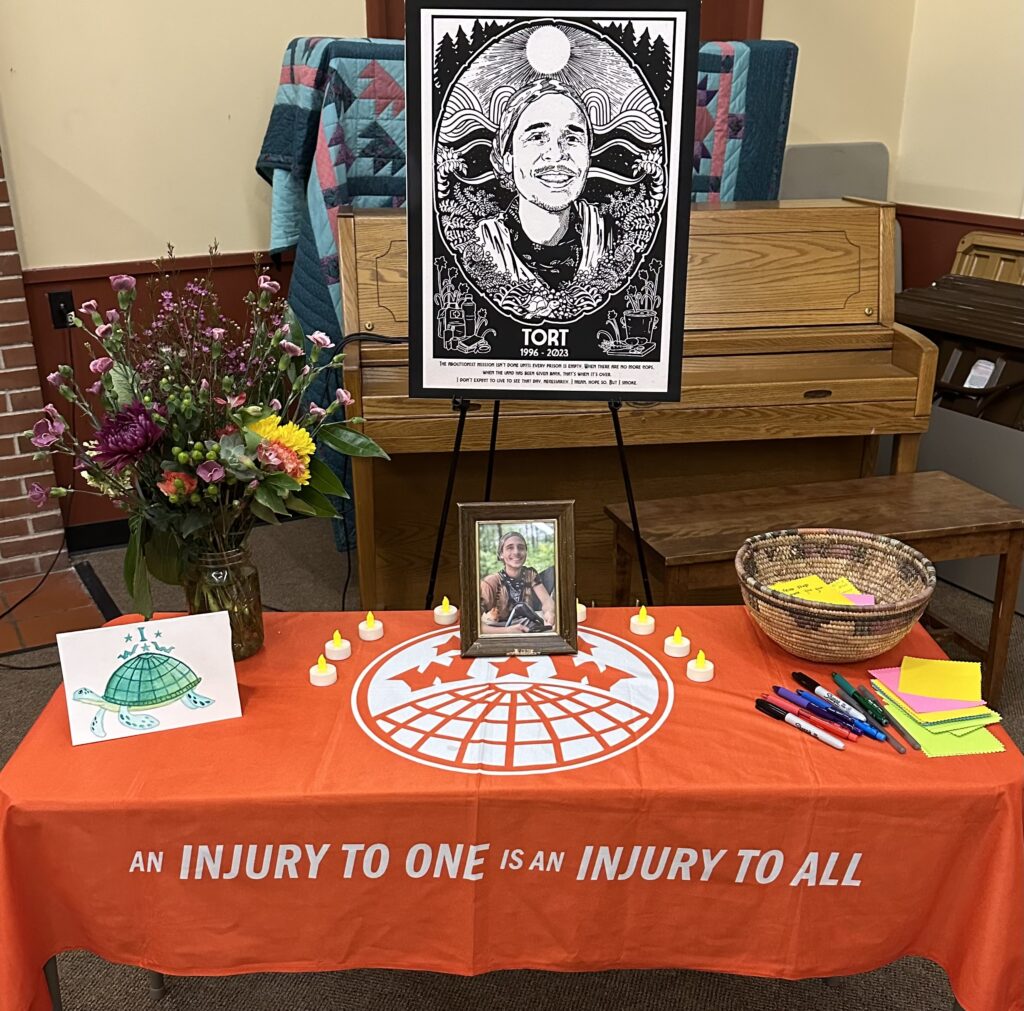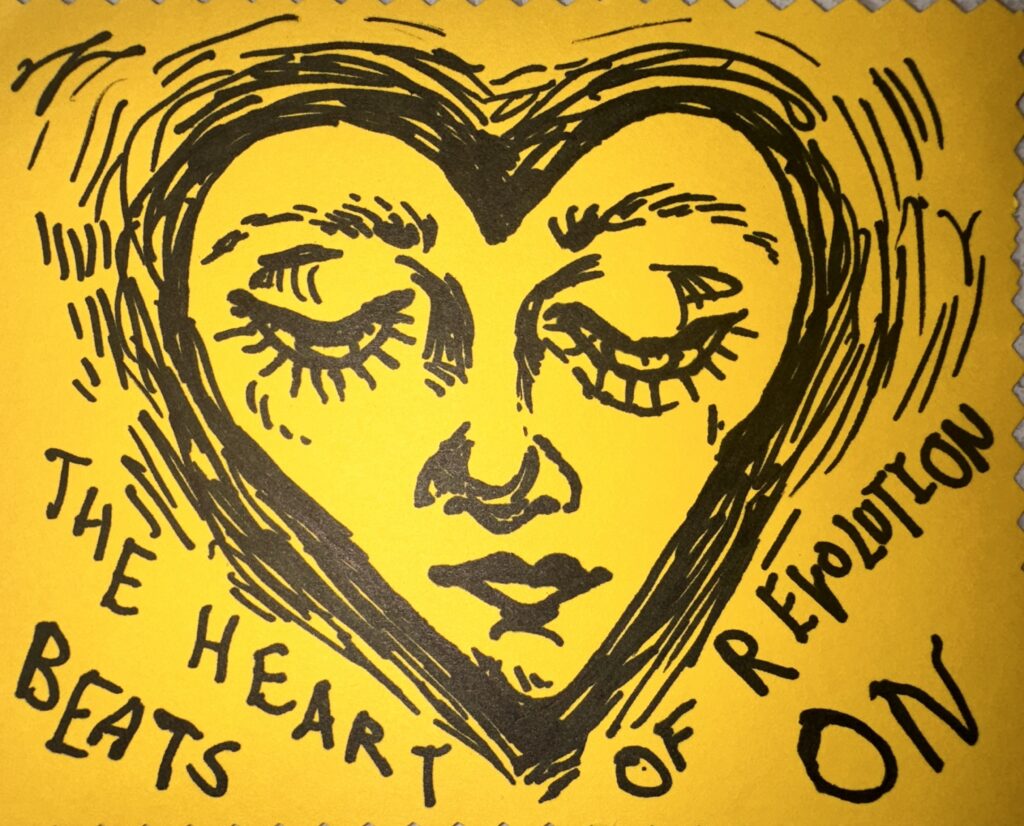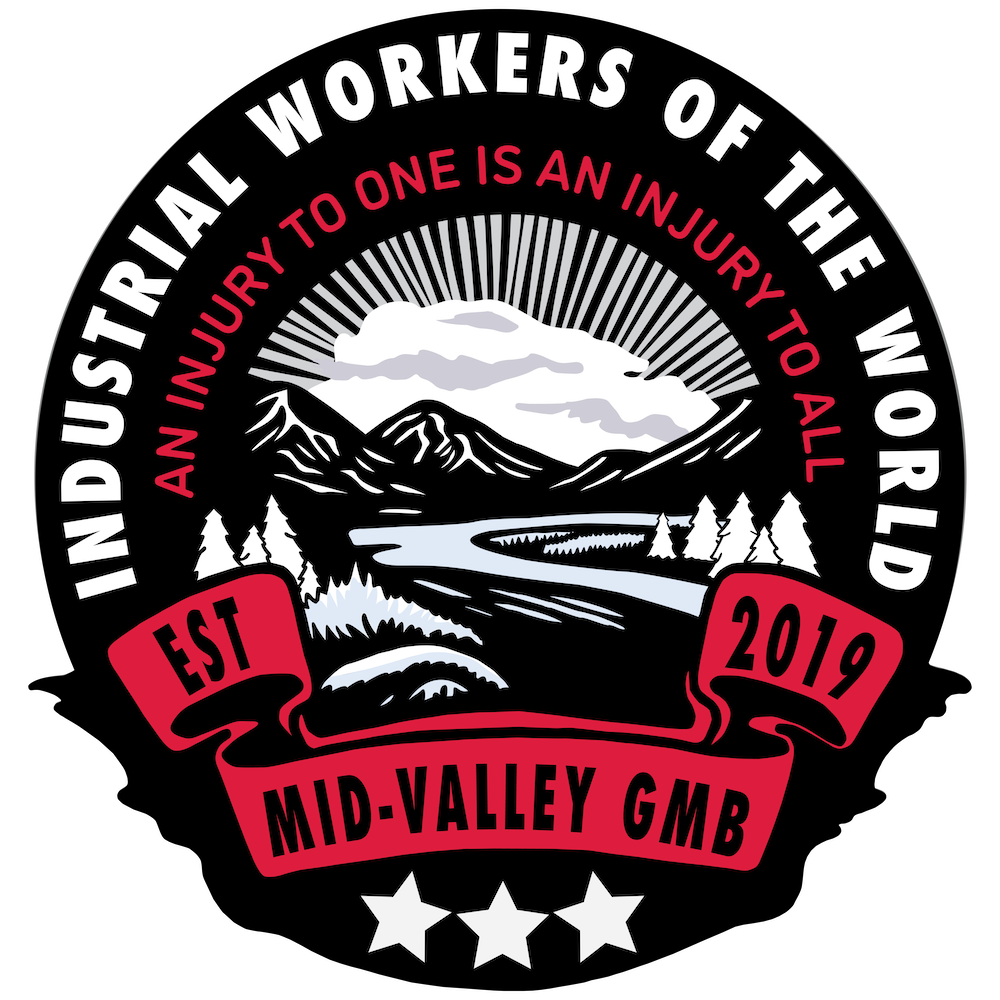
Community activists and allies gathered at Westminster House in Corvallis last Thursday, January 18, 2024 to mourn and celebrate the life of Tortuguita, the activist murdered by Georgia State Police in the Weelaunee Forest as they protested “Cop City.”
A piece of artwork created by N.O. Bonzo overlooked a memorial altar with flowers and candles where attendees wrote words of endearment and one person offered their own artwork; one attendee discussed the importance of solidarity within the community and the work that still needed to be accomplished together. Guests finished the celebration of life of Tortuguita in spirited conversation with one another.
Below are some words shared by the attendees:
“I am so happy to have learned about you but so sad to know why. You are an inspiration to people fighting for freedom and the environment around the world. They hold your name and story in their minds and hearts and on posters, zines and presentations around Turtle Island and the planet. Thank you for your effort, your care, your empathy, and your life.”
“Tort, your inspiration circles through our movements. Solidarity forever!”
“Rest in power, Tortuguita. For our Forest. For our friends. For our future.”
“Rest in peace and in power. I’m sorry this sacrifice was forced upon you. It shouldn’t have been. We’ll never forget you, Tort.”
“Hey Tort. We share your dream, and will carry your memory. Rest in peace and power.”

The Branch Secretary of the Mid-Valley General Membership Branch of the IWW gave a speech to memorialize the fallen organizer, who was also an officer of the Tallahassee Branch of the IWW in Florida:
Good Evening, and thank you to everyone in attendance of this memorial event, and thank you to the organizers of the Heart of the Valley Anti Capitalist Bookfair for their promotion. The artwork is courtesy of N.O. Bonzo with the Justseeds Artists’ Cooperative.
We’re here to celebrate the life of Manuel Esteban Paez Teran, a queer and non-binary Indigenous Venezuelan also known to their community as Manny, or Tortuguita, meaning Little Turtle in Spanish. They were a graduate of Florida State University, a beloved housing and environmental activist whose work spanned from Florida to the Weelaunee Forest in Atlanta, and they were also an officer of the Tallahassee Branch of the IWW. Tortuguita chose this name as a reference to the military commander who led indigenous forces to their most decisive victory against the US Army in 1791.
A member of the Tallahassee Branch recalled that: “Manny was a close friend, comrade, and above all, a constant fighter for working people. I knew them in Tallahassee through the IWW, Food Not Bombs, and Live Oak Radical Ecology and I will never cease to be amazed by their tireless activism, their extreme empathy, and their ability to make everyone feel welcome in radical spaces. They died as they lived, fighting for a better world and defending the forest from destruction in the name of a fascist militarized police force.”
The Weelaunee forest is to be demolished to make way for a $90 million dollar militarized training complex referred to as “Cop City” by protestors. Manny was visiting Atlanta in solidarity with the protestors there, supporting their effort to stop Cop City from coming to fruition. The land to be used for Cop City was once the home of the Indigenous Muscogee people, who called the land Weelaunee, meaning Brown Water Place, in reference to the river that runs through. The Muscogee were forcibly removed in the 1830s during the Trail of Tears and the forest suffered greatly from the logging activities that followed. This area was later home to the Atlanta Prison Farm and the Atlanta Federal Penitentiary which saw notable incarcerated activists like Eugene Debs, Kwame Ture, and many others. The area surrounding the planned site of Cop City is primarily located in DeKalb County and is part of a region with a significant Black population. Critics of the project have raised concerns about the impact on the area’s majority Black population, arguing that the training center represents a further militarization of the Atlanta Police Department and exacerbates violence against Black communities in the city.
A primary issue is the deforestation and consequent loss of green space in the South River Forest, which threatens local biodiversity and disrupts ecosystem services. Such extensive clearing of land will also endanger wildlife, leading to habitat loss and a decline in biodiversity. The project will place water quality in jeopardy, as the construction and operation of the facility could negatively impact the watershed, potentially affecting both aquatic life and downstream water resources. Soil erosion and increased sedimentation are additional concerns, alongside the introduction of noise and light pollution from the facility’s activities, which could disturb both wildlife and nearby residents. Air quality may also suffer due to construction and ongoing operations. Beyond the immediate environmental ramifications, there’s the loss of cultural and recreational value associated with the forested area, coupled with broader climate impacts, including exacerbating urban heat island effects
One year ago today, Manny occupied a tent as a defender of this forest while a multi-agency raid to remove protestors began. By the end of the raid, Tortuguita was fired upon dozens of times and murdered by the police. Although the police claimed that Manny had fired at them first, an independent autopsy revealed that they were likely sitting cross-legged with their hands in the air, and that no gun residue was found on their hands. Police have still refused to show evidence that corroborates their claims. Their mother, Belkis Teran, said “I’m going to clear Manuel’s name; they killed them, like they tear down the trees in the forest – A forest Manuel loved with passion”. Since then, over 60 protestors have been charged with serious crimes in an effort to stifle the resistance against the building of Cop City. Their mother said that “Manuel loved the forest, they meditated there, the forest connected them with God – I never thought that Manuel could die in a meditation position. My heart is destroyed.”
We’re here this evening to celebrate the life of our friend and fellow worker Tortuguita and to mourn the loss of a great organizer that had a great impact during their time on this Earth. Just as equally, we must honor their remarkable impact with a commitment to organization against the forces that continue to take the lives of our bravest and most dedicated. Whether you’re a community activist, an abolitionist, an environmentalist, a housing advocate, or a union member; we have an obligation to build a fair and just society in which we no longer have to mourn the violent deaths of those who do what it takes to build such a world. Manny was all of these things and more; they spent time in Florida helping to build housing in low income communities affected by a hurricane, they were active in the union movement with their local IWW branch, they were a trained medic, supported mutual aid efforts, advocated for oppressed communities, and spent their last moments protecting a sacred forest from destruction.
Manny said that “The abolitionist mission isn’t done until every prison is empty – When there are no more cops, when the land has been given back, that’s when it’s over – I don’t expect to live to see that day, necessarily” Malcolm X once appropriately remarked that “the price of freedom is death; If you’re not ready to die for it, put the word ‘freedom’ out of your vocabulary.”
We are reminded, painfully so, that this system does not sleep in its efforts to silence us, to oppress us. So, we too must not rest. Many times we feel tired and beaten down from existing under a morally corrupt system that has consistently and violently taken our greatest organizers away from their communities and their movements. But the best way to honor Tortuguita is to make a conscious decision that we will continue the fight no matter how difficult it may become. If we’re so lucky to wake up each day, we should make the deliberate choice to spend our time advocating for a fair and just society in the way that Tortuguita did. They believed that “the right kind of resistance is peaceful, because that’s where we win – We’re not going to beat them at violence. They’re very, very good at violence – We win through nonviolence. That’s really the only way we can win. We don’t want more people to die.”
They understood that violence was the language and tool of the oppressor. These forces destroy our forests, they poison our water, they cut the tops off of our mountains, and they kill our activists, all in the name of profit. Like the great Fred Hampton said, “we’re not going to fight fire with fire, we’re going to fight fire with water. We’re going to fight racism not with racism, but we’re going to fight with solidarity.” Tortuguita recognized that adopting a nonviolent approach doesn’t equate to passivity or submission in the face of oppression. Their understanding was that nonviolence isn’t about conceding to the whims of an oppressor or remaining inactive while injustices unfold.
It all begins in our own backyard, in the communities where we live. The essence of genuine change and moral authority lies in addressing the issues that are right in front of us. We cannot credibly speak on the troubles of others, or propose solutions for the world at large, until we confront and begin to resolve the problems that exist within our own environment.
Each of us gathered here today should remain deeply engaged in our communities. There’s a profound need for us to extend our support to the local organizations and groups that tirelessly work towards addressing the challenges we collectively face. Too often, the burden of these efforts falls disproportionately on the shoulders of a handful of dedicated organizers like Manny. These individuals, although they’re driven by a commendable sense of purpose and commitment, are frequently stretched thin, attempting to manage what are, in reality, our shared responsibilities as a community. Let’s get out and talk with and care for our unhoused community members; attend our local council meetings and pressure them to pass laws that create affordable housing, that protect our environment, and that create a community which uplifts all people of diverse cultures, abilities, and gender identities, not just the wealthy elites; organize with your coworkers and form a union in your workplace so that workers receive the dignity that they deserve. These are the things that will continue to honor Tortuguita’s memory, along with all of those organizers for a better world that are no longer here with us.
I’ll end with one last quote that came from Tortuguita’s father as he searched through their possessions at the place where they were killed, which included a bright red suitcase that had traveled with them to defend the forest:
“You forgot your suitcase. But you won’t be needing it in the journey you’re on … I’m sorry I didn’t always understand you, or what you were doing. But now I do.”
